情态动词shall,would,may用法练习答案解析
情态动词(基础讲解)

情态动词的用法【用法讲解】考试要求:中考要求掌握情态动词在一般疑问句的问与答,理解情态动词表示猜测的用法及情态动词的被动语态应用.情态动词表示说话人对某一动作或状态的态度,认为“可能”,“应该”或“必要”等。
情态动词本身词义不完全,不能独立作谓语动词,必须和动词原形连用(ought除外)。
情态动词没有人称和单复数的变化。
常用情态动词有can(could),may(might),must, ought to,have to,need, dare, shall(should),will(would)。
1. 情态动词can 和could的主要用法(1)表示能力,意为“能,会”。
Can you swim? 你能游泳吗?His granny is over eighty but still can read without glasses。
他的奶奶虽然八十多岁了,但是仍旧不用戴眼镜能够阅读。
注意:can和be able to表示“能力”时的区别:can只有现在式和过去式两种形式,而be able to除了现在式和过去式,还有将来式和完成式等多种形式.She will be able to help you tomorrow afternoon。
明天下午她将能帮助你.This is the information that I have been able to get so far.这是我到目前为止能得到的信息。
(2)表示“许可,允许"。
can 和could没有时态上的区别,could比can在语气上更客气;在回答could引导的一般疑问句时要用can。
Could/Can you tell me the way to the railway station?你能告诉我去火车站的路吗?—Could I use your pen?我可以用你的钢笔吗?—Yes,of course you can。
是,当然你可以。
(完整版)情态动词must、can、could、may、might精解
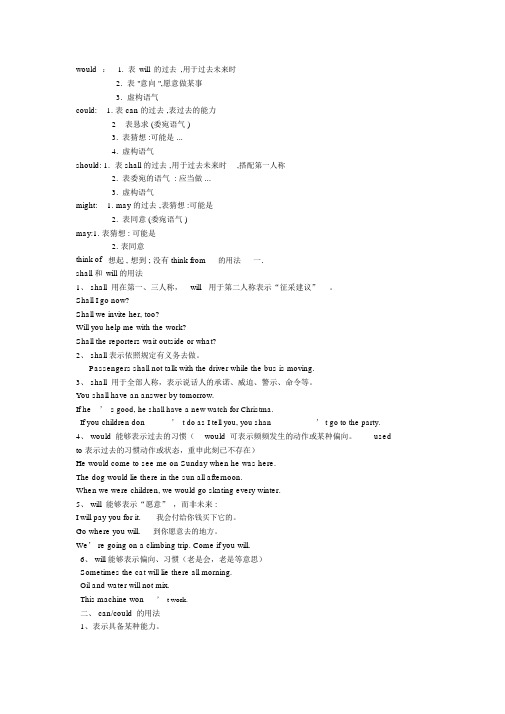
would: 1.表will的过去,用于过去未来时2.表 "意向 ",愿意做某事3.虚构语气could: 1. 表 can 的过去 ,表过去的能力2表恳求 (委宛语气 )3.表猜想 :可能是 ...4.虚构语气should: 1. 表 shall 的过去 ,用于过去未来时,搭配第一人称2.表委宛的语气 : 应当做 ...3.虚构语气might: 1. may 的过去 ,表猜想 :可能是2.表同意 (委宛语气 )may:1. 表猜想 : 可能是think of shall 和2. 表同意想起 , 想到 ; 没有 think fromwill 的用法的用法一.1、 shall 用在第一、三人称,will用于第二人称表示“征采建议”。
Shall I go now?Shall we invite her, too?Will you help me with the work?Shall the reporters wait outside or what?2、 shall 表示依照规定有义务去做。
Passengers shall not talk with the driver while the bus is moving.3、 shall 用于全部人称,表示说话人的承诺、威迫、警示、命令等。
You shall have an answer by tomorrow.If he’ s good, he shall have a new watch for Christma.If you children don’ t do as I tell you, you shan’ t go to the party. 4、 would 能够表示过去的习惯(would 可表示频频发生的动作或某种偏向。
used to 表示过去的习惯动作或状态,重申此刻已不存在)He would come to see me on Sunday when he was here.The dog would lie there in the sun all afternoon.When we were children, we would go skating every winter.5、 will 能够表示“愿意” ,而非未来 :I will pay you for it.我会付给你钱买下它的。
【英语】情态动词练习题含答案及解析
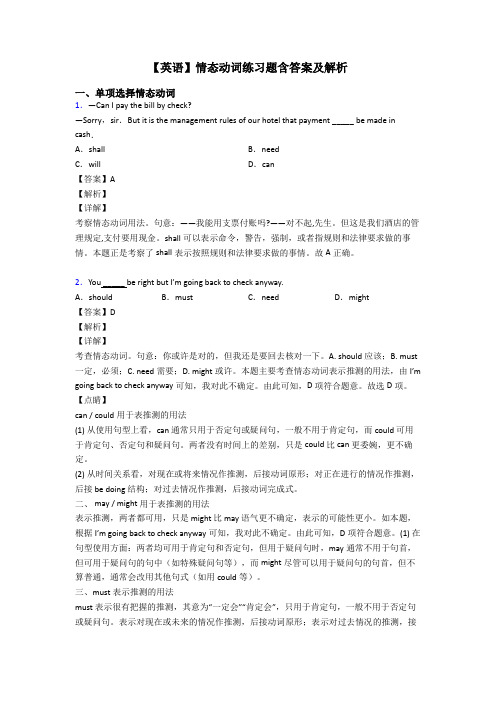
【英语】情态动词练习题含答案及解析一、单项选择情态动词1.—Can I pay the bill by check?—Sorry,sir.But it is the management rules of our hotel that payment _____ be made in cash.A.shall B.needC.will D.can【答案】A【解析】【详解】考察情态动词用法。
句意:——我能用支票付账吗?——对不起,先生。
但这是我们酒店的管理规定,支付要用现金。
shall可以表示命令,警告,强制,或者指规则和法律要求做的事情。
本题正是考察了shall表示按照规则和法律要求做的事情。
故A正确。
2.You _____ be right but I’m going back to check anyway.A.should B.must C.need D.might【答案】D【解析】【详解】考查情态动词。
句意:你或许是对的,但我还是要回去核对一下。
A. should应该;B. must 一定,必须;C. need需要;D. might或许。
本题主要考查情态动词表示推测的用法,由I’m going back to check anyway可知,我对此不确定。
由此可知,D项符合题意。
故选D项。
【点睛】can / could用于表推测的用法(1) 从使用句型上看,can 通常只用于否定句或疑问句,一般不用于肯定句,而could 可用于肯定句、否定句和疑问句。
两者没有时间上的差别,只是could 比 can 更委婉,更不确定。
(2) 从时间关系看,对现在或将来情况作推测,后接动词原形;对正在进行的情况作推测,后接 be doing 结构;对过去情况作推测,后接动词完成式。
二、 may / might用于表推测的用法表示推测,两者都可用,只是 might 比 may 语气更不确定,表示的可能性更小。
情态动词的用法及练习(附答案)

情态动词的用法及专项练习第1 & 2类:词形词的含义例句can ①“能力”②“允许”③“可能性”(0%)④“请求”I can speak English.Can I go to the toilet.It can’t be Susan. She is in Paris. Can you help me?could ①“过去的能力”②“过去的允许”③“可能性”(30%)④“请求”, 比can更客气⑤“建议”⑥“将来的一种可能性”She could speak English When she was 5 years old. Could I borrow your dictionary?It could get much colder in January.Could you please say that again more slowly.We could try to fix it ourselves.I think we could go to war again.be able to “能力”= can, 但比can的时态更具多样性。
can无法表达的时态,用be able to表达。
She will be able to teach English. (一般将来时)She was able to talk when she was 2 years old. (一般过去时)I would love to be able to play the piano. (动词不定式)may ①“请求、允许”(比较礼貌)②“将来的可能性”(50%)③may 在更多的时态中经常May I come in?It may rain tomorrow.第1类:十大情态动词can / could / may / might / must / ought to / shall / should / will / would 第2类:半情态词及充当情态动词的词had better / be able to / have to / used to / need / dare用be allowed to来代替might “较小的可能性”(≤30%)I might move to Canada some day.must ①“必须”(责任、义务)②“可能性”(推测) (100%)③“禁止”(否定式) Everyone must pay taxes.She didn’t arrive. She must be sick.You mustn’t p l ay with fire. It’s dangerous.have to ①“必须、不得不”(客观上不得不做)②多种时态里面代替“must”,因must只有一般现在,但have to 可以有多种时态。
情态动词详解、典型例题及模拟试题(含答案)教学文案
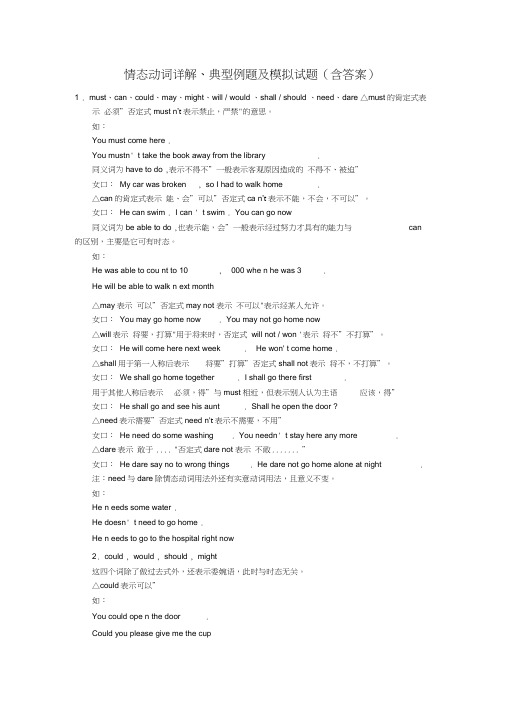
情态动词详解、典型例题及模拟试题(含答案)1 . must、can、could、may、might、will / would 、shall / should 、need、dare △must的肯定式表示必须”否定式must n't表示禁止,严禁"的意思。
如:You must come here .You mustn' t take the book away from the library .同义词为have to do ,表示不得不”一般表示客观原因造成的不得不、被迫”女口:My car was broken , so I had to walk home .△can的肯定式表示能、会”可以”否定式ca n't表示不能,不会,不可以”。
女口:He can swim . I can ' t swim . You can go now同义词为be able to do ,也表示能,会”一般表示经过努力才具有的能力与can 的区别,主要是它可有时态。
如:He was able to cou nt to 10 , 000 whe n he was 3 .He will be able to walk n ext month△may表示可以”否定式may not 表示不可以"表示经某人允许。
女口:You may go home now . You may not go home now△will表示将要,打算"用于将来时,否定式will not / won '表示将不”不打算”。
女口:He will come here next week . He won' t come home .△shall用于第一人称后表示将要”打算”否定式shall not表示将不,不打算”。
女口:We shall go home together . I shall go there first .用于其他人称后表示必须,得”与must相近,但表示别人认为主语应该,得”女口:He shall go and see his aunt . Shall he open the door ?△need表示需要”否定式need n't表示不需要,不用”女口:He need do some washing . You needn' t stay here any more .△dare表示敢于.... "否定式dare not 表示不敢....... ”女口:He dare say no to wrong things . He dare not go home alone at night .注:need与dare除情态动词用法外还有实意动词用法,且意义不变。
【英语】高考英语易错题专题三情态动词(含解析)
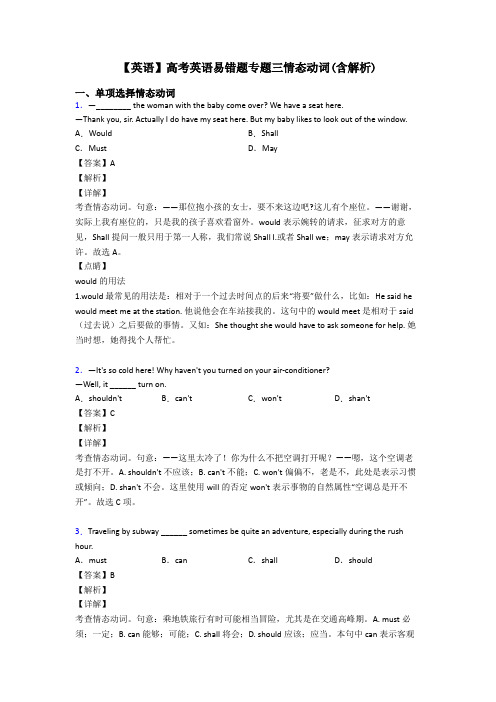
C.won'tD.shouldn't
【答案】D
【解析】
【详解】
考查情态动词。句意:我们不应该把拥有洁净的饮用水看作是理所当然的。也许有一天,我们会用完它。shouldn't“不应该”,符合句意。needn't不必;can't不可能;won't将不。故选D。
9.It_____ have been Tom that parked the car here, as he is the only one with a car.
12.One of our rules is that every student _______ wear school uniform while at school.
A.mightB.could
C.shallD.will
【答案】C
【解析】
【详解】
考查情态动词辨析。句意:我们其中一条规则要求每个学生在校期间都要穿校服。shall可以表示“命令,警告,强制要求;允诺;法律,规定要做……”,结合句意可知C正确。
I guess the poet would have been about twenty when she wrote her first poem.
13.It has been announced that all the candidates ___________ remain in their seats until all the papers have been collected.
A.shallB.could
C.wouldD.ought
【点睛】
would的用法
英语情态动词用法详解
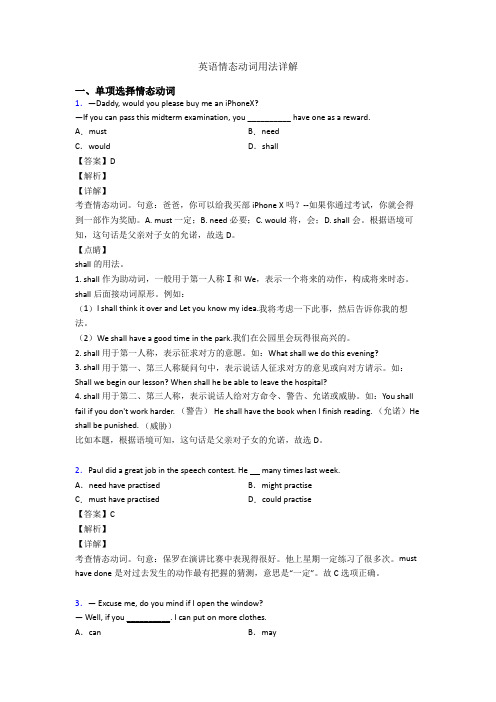
英语情态动词用法详解一、单项选择情态动词1.—Daddy, would you please buy me an iPhoneX?—If you can pass this midterm examination, you __________ have one as a reward.A.must B.needC.would D.shall【答案】D【解析】【详解】考查情态动词。
句意:爸爸,你可以给我买部iPhone X吗?--如果你通过考试,你就会得到一部作为奖励。
A. must一定;B. need必要;C. would将,会;D. shall会。
根据语境可知,这句话是父亲对子女的允诺,故选D。
【点睛】shall的用法。
1. shall作为助动词,一般用于第一人称Ⅰ和We,表示一个将来的动作,构成将来时态。
shall后面接动词原形。
例如:(1)I shall think it over and Let you know my idea.我将考虑一下此事,然后告诉你我的想法。
(2)We shall have a good time in the park.我们在公园里会玩得很高兴的。
2. shall用于第一人称,表示征求对方的意愿。
如:What shall we do this evening?3. shall用于第一、第三人称疑问句中,表示说话人征求对方的意见或向对方请示。
如:Shall we begin our lesson? When shall he be able to leave the hospital?4. shall用于第二、第三人称,表示说话人给对方命令、警告、允诺或威胁。
如:You shall fail if you don't work harder. (警告) He shall have the book when I finish reading. (允诺)He shall be punished. (威胁)比如本题,根据语境可知,这句话是父亲对子女的允诺,故选D。
初一情态动词讲解及练习附答案

(could), may (might), must, have to, shall (should, will (would), dare (dared), need (needed), ought to等。
情态动词无人称和数的变化;不能单独使用,必须与其后的动词原形构成谓语一、can, could1) 表示能力(体力、知识、技能)。
Can you lift this heavy box?(体力)Mary can speak three languages.(知识)Can you skate?(技能)此时可用be able to代替。
Can只有一般现在时和一般过去式;而be able to则有更多的时态。
I’ll not be able to come this afternoon.当表示“经过努力才得以做成功某事”时应用be able to,不能用Can。
如:He was able to go to the party yesterday evening in spite of the heavy rain.2) 表示请求和允许。
-----Can I go now? ----- Yes, you can. / No, you can’t. 此时可与may互换。
在疑问句中还可用could, might代替,不是过去式,只是语气更委婉,不能用于肯定句和答语中。
---- Could I come to see you tomorrow? ---- Yes, you can. ( No, I’m afraid not. )3) 表示客观可能性(客观原因形成的能力)。
They’ve changed the timetable, so we can go by bus instead. This hall can hold 500 people at least.4) 表示推测(惊讶、怀疑、不相信的态度),用于疑问句、否定句和感叹句中。
2021年上海市中考英语语法复习:情态动词讲解及提升练习(有答案)
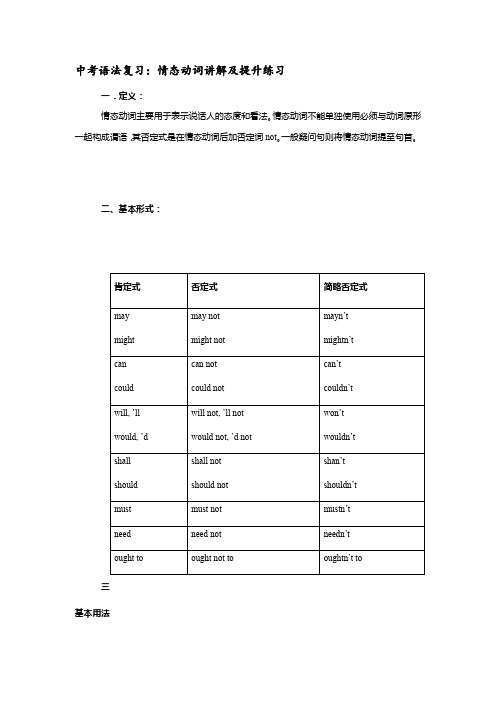
中考语法复习:情态动词讲解及提升练习一.定义:情态动词主要用于表示说话人的态度和看法。
情态动词不能单独使用必须与动词原形一起构成谓语,其否定式是在情态动词后加否定词not。
一般疑问句则将情态动词提至句首。
二、基本形式:三基本用法1. can 的用法1)表能力can表能力时意味着凭体力或脑力或技术等可以无甚阻力地去做某事。
I can climb this pole. 我能爬这根杆子。
He is only four , but he can read. 他只有4岁,但已认得字了。
Fire can’t destroy gold. 火烧不毁金子。
2)表可能性多用于否定与疑问结构中,但也可用在肯定句中。
Can the news be true? 这消息可能是真的吗?It can’t be true. 它不可能是真的。
What can he possibly mean? 他可能是什么意思?3)表示允许(和may意思相近)常见于口语。
Can (May) I come in ? 我能进来吗?Can I smoke here ? 我可以在这里抽烟吗?2.could的用法1)表过去的可能和许可,Father said I could swim in the river. 爸爸说我可以在河里游泳。
2)表过去的能力I could swim when I was only six. 我刚六岁就能游泳。
3)表“允许”。
可表示委婉客气的提出问题或陈述看法,不是can的过去时态。
---Could I use your bike? ---Yes, you can./No, you can’t.注意:be able to 表示能力,意为“能够做成某事”,相当于can 的用法,但是有区别:can泛指一般的能力;be able to 则主要指成功做了某件事的能力。
3. may(might)的用法1)表示请求、可以、允许。
You may drive the tractor. 你可以开那台拖拉机。
【英语】高考英语情态动词题20套(带答案)及解析
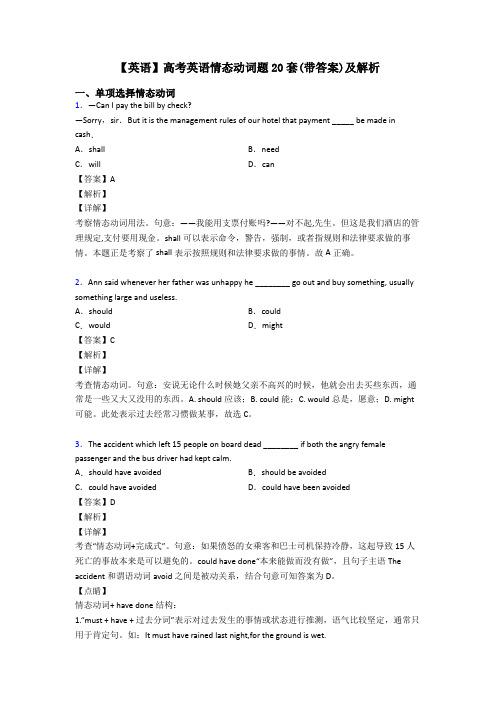
【英语】高考英语情态动词题20套(带答案)及解析一、单项选择情态动词1.—Can I pay the bill by check?—Sorry,sir.But it is the management rules of our hotel that payment _____ be made in cash.A.shall B.needC.will D.can【答案】A【解析】【详解】考察情态动词用法。
句意:——我能用支票付账吗?——对不起,先生。
但这是我们酒店的管理规定,支付要用现金。
shall可以表示命令,警告,强制,或者指规则和法律要求做的事情。
本题正是考察了shall表示按照规则和法律要求做的事情。
故A正确。
2.Ann said whenever her father was unhappy he ________ go out and buy something, usually something large and useless.A.should B.couldC.would D.might【答案】C【解析】【详解】考查情态动词。
句意:安说无论什么时候她父亲不高兴的时候,他就会出去买些东西,通常是一些又大又没用的东西。
A. should应该;B. could能;C. would总是,愿意;D. might 可能。
此处表示过去经常习惯做某事,故选C。
3.The accident which left 15 people on board dead ________ if both the angry female passenger and the bus driver had kept calm.A.should have avoided B.should be avoidedC.could have avoided D.could have been avoided【答案】D【解析】【详解】考查“情态动词+完成式”。
情态动词shall
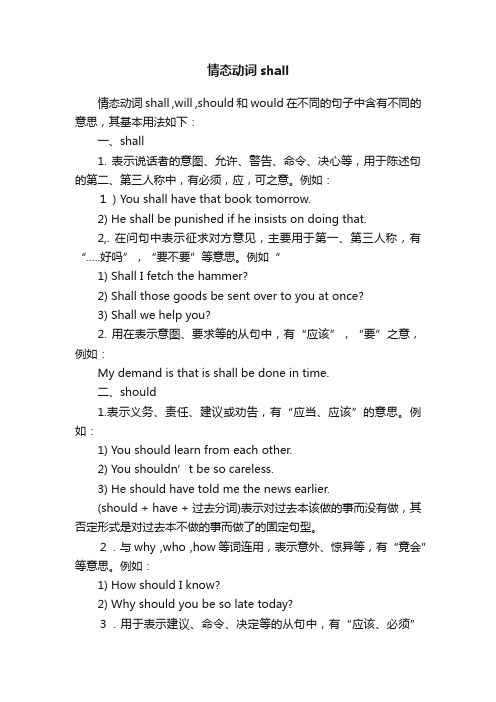
情态动词shall情态动词shall ,will ,should和would 在不同的句子中含有不同的意思,其基本用法如下:一、shall1. 表示说话者的意图、允许、警告、命令、决心等,用于陈述句的第二、第三人称中,有必须,应,可之意。
例如:1)You shall have that book tomorrow.2) He shall be punished if he insists on doing that.2,. 在问句中表示征求对方意见,主要用于第一、第三人称,有“…..好吗”,“要不要”等意思。
例如“1) Shall I fetch the hammer?2) Shall those goods be sent over to you at once?3) Shall we help you?2. 用在表示意图、要求等的从句中,有“应该”,“要”之意,例如:My demand is that is shall be done in time.二、should1.表示义务、责任、建议或劝告,有“应当、应该”的意思。
例如:1) You should learn from each other.2) You shouldn’t be so careless.3) He should have told me the news earlier.(should + have + 过去分词)表示对过去本该做的事而没有做,其否定形式是对过去本不做的事而做了的固定句型。
2.与why ,who ,how等词连用,表示意外、惊异等,有“竟会”等意思。
例如:1) How should I know?2) Why should you be so late today?3.用于表示建议、命令、决定等的从句中,有“应该、必须”的意思。
例如:1) The young doctor proposed that he should try the experiment on himself.2) It was decided that we should start a cleanup at once.4。
2021届 高中英语语法--情态动词复习+练习含答案
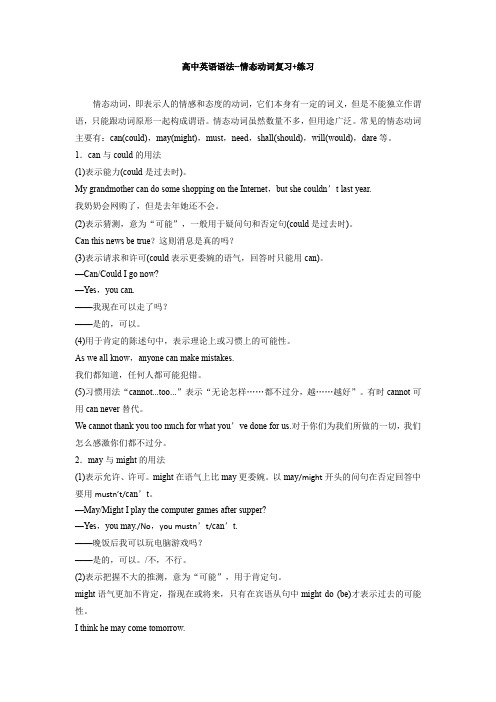
高中英语语法--情态动词复习+练习情态动词,即表示人的情感和态度的动词,它们本身有一定的词义,但是不能独立作谓语,只能跟动词原形一起构成谓语。
情态动词虽然数量不多,但用途广泛。
常见的情态动词主要有:can(could),may(might),must,need,shall(should),will(would),dare等。
1.can与could的用法(1)表示能力(could是过去时)。
My grandmother can do some shopping on the Internet,but she couldn’t last year.我奶奶会网购了,但是去年她还不会。
(2)表示猜测,意为“可能”,一般用于疑问句和否定句(could是过去时)。
Can this news be true?这则消息是真的吗?(3)表示请求和许可(could表示更委婉的语气,回答时只能用can)。
—Can/Could I go now?—Yes,you can.——我现在可以走了吗?——是的,可以。
(4)用于肯定的陈述句中,表示理论上或习惯上的可能性。
As we all know,anyone can make mistakes.我们都知道,任何人都可能犯错。
(5)习惯用法“cannot...too...”表示“无论怎样……都不过分,越……越好”。
有时cannot可用can never替代。
We cannot thank you too much for what you’ve done for us.对于你们为我们所做的一切,我们怎么感激你们都不过分。
2.may与might的用法(1)表示允许、许可。
might在语气上比may更委婉。
以may/might开头的问句在否定回答中要用mustn’t/can’t。
—May/Might I play the computer games after supper?—Yes,you may./No,you mustn’t/can’t.——晚饭后我可以玩电脑游戏吗?——是的,可以。
英语情态动词专项习题及答案解析

英语情态动词专项习题及答案解析一、单项选择情态动词1.—________ the woman with the baby come over? We have a seat here.—Thank you, sir. Actually I do have my seat here. But my baby likes to look out of the window. A.Would B.ShallC.Must D.May【答案】A【解析】【详解】考查情态动词。
句意:——那位抱小孩的女士,要不来这边吧?这儿有个座位。
——谢谢,实际上我有座位的,只是我的孩子喜欢看窗外。
would表示婉转的请求,征求对方的意见,Shall提问一般只用于第一人称,我们常说Shall I.或者 Shall we;may表示请求对方允许。
故选A。
【点睛】would的用法1.would 最常见的用法是:相对于一个过去时间点的后来“将要”做什么,比如:He said he would meet me at the station. 他说他会在车站接我的。
这句中的 would meet 是相对于 said (过去说)之后要做的事情。
又如:She thought she would have to ask someone for help. 她当时想,她得找个人帮忙。
2.—I feel a little nervous.—Take it easy. You __________ have difficulty passing the exam when you have prepared for it well.A.mustn’t B.needn’t C.may not D.shouldn’t【答案】D【解析】【详解】考查情态动词。
句意:——我觉得有点紧张。
——不要着急。
当你准备充分时,通过考试应该不会有困难。
A. mustn’t禁止,不允许;B. needn’t不必;C. may not可能不会;D. shouldn’t不应该。
英语情态动词含答案解析

英语情态动词含答案解析一、情态动词单项选择题1.—Will Jim come to Yangzhou for a holiday?—He ________come and it depends on how much homework he will have.A.may B.should C.must D.need【答案】A【解析】【详解】句意:——吉姆会来扬州度假吗?——他可能会来,这要看他有多少家庭作业。
考查情态动词词义辨析。
may可以,表达推测时,表示“可能”;should应该;must必须,表达推测时,表示“一定”;need需要。
由答语后半句“it depends on how much homework he will have.”可知,此句是说吉姆来不来取决于作业的多少,所以是可能来,用may表示推测,故选A。
2.Everything is changing. Things that weren’t accepted in the past ________ be very popular now.A.should B.may C.must D.can【答案】B【解析】【分析】【详解】句意:一切都在改变。
过去不被接受的东西现在可能很流行。
考查情态动词。
should应该;may可能;must必须;can可以。
根据“Everything is changing.”"可知过去不被接受的东西现在可能很流行,用may表推测。
故选B。
3.—Is the man over there Mr. Brown?—It _________ be him. He’s much shorter.A.must B.can’t C.needn’t D.may【答案】B【解析】【详解】句意:——那边那个男人是布朗先生吗?——不可能是他,他矮得多。
考查情态动词。
must表示肯定推测,意为“一定”;can’t表示否定推测,意为“不可能”;needn’t不必;may表示可能性推测,意为“可能”。
【英语】英语情态动词题20套(带答案)及解析
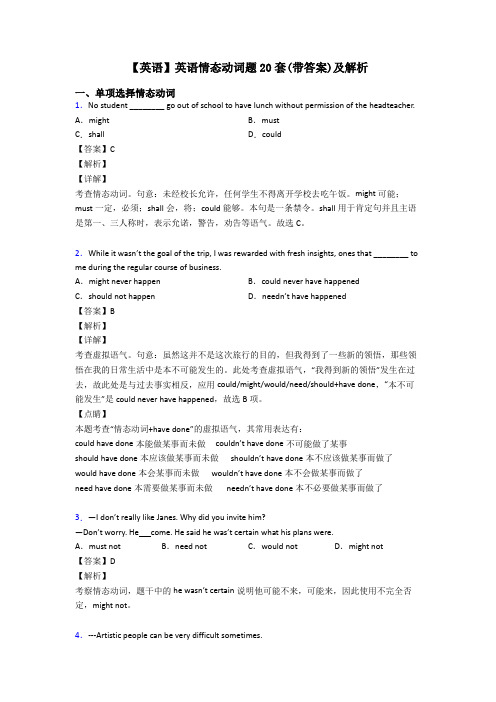
【英语】英语情态动词题20套(带答案)及解析一、单项选择情态动词1.No student ________ go out of school to have lunch without permission of the headteacher. A.might B.mustC.shall D.could【答案】C【解析】【详解】考查情态动词。
句意:未经校长允许,任何学生不得离开学校去吃午饭。
might可能;must一定,必须;shall会,将;could能够。
本句是一条禁令。
shall用于肯定句并且主语是第一、三人称时,表示允诺,警告,劝告等语气。
故选C。
2.While it wasn’t the goal of the trip, I was rewarded with fresh insights, ones that ________ to me during the regular course of business.A.might never happen B.could never have happenedC.should not happen D.needn’t h ave happened【答案】B【解析】【详解】考查虚拟语气。
句意:虽然这并不是这次旅行的目的,但我得到了一些新的领悟,那些领悟在我的日常生活中是本不可能发生的。
此处考查虚拟语气,“我得到新的领悟”发生在过去,故此处是与过去事实相反,应用could/might/would/need/should+have done,“本不可能发生”是could never have happened,故选B项。
【点睛】本题考查“情态动词+have done”的虚拟语气,其常用表达有:could have done本能做某事而未做couldn’t have done不可能做了某事should have done本应该做某事而未做shouldn’t have done本不应该做某事而做了would have done本会某事而未做wouldn’t have done本不会做某事而做了need have done本需要做某事而未做needn’t have done本不必要做某事而做了3.—I don’t really like Janes. Why did you invite him?—Don’t worry. He come. He said he was’t certain what his plans were.A.must not B.need not C.would not D.might not【答案】D【解析】考察情态动词,题干中的he wasn’t certain说明他可能不来,可能来,因此使用不完全否定,might not。
【精品】情态动词选择题练习和答案

【精品】情态动词选择题练习和答案一、单项选择情态动词1.I’m sorry, but you go wrong. There,s no such man here.A. needB. canC. mustD. will【答案】C【解析】【详解】考查情态动词。
句意:很抱歉,但是你一定是弄错了。
这儿没有这么个人。
A. need需要;B. can能够;C. must必须;D. will将会。
must指有把握的推测,“一定;必定”,结合下文There,s no such man here.可知一定是弄错了。
故选C。
2.-- Did Jim come?--1 don,t know. He while I was out.A. might have comeB. might comeC. must have comeD. should have come【答案】A【解析】【详解】考查情态动词推测用法。
句意:Jim来了吗?--我不知道,在我不在的时候,可能来过。
根据前文I don,t know.可知,说话者不知道Jim来没来,因此后文推测来过,但是语气很不确定,故可知选A。
对过去情况的推测为情态动词+have done, must have done一定做了某事,should have done应该来过,不符合,故选A。
【点睛】情态动词+have+过去分词的用法,表示推测或判断过去的情况。
can/could+have+过去分词用法:①多用于否定句和疑问句中。
表示对过去某事发生的可能性的否定或质疑,意为:不可能(已经)……了-(否定句)/可能(已经)……了嘛?-(疑问句)②用于肯定句中。
表示对过去没有做某事的遗憾,含有轻微的责备,意为:本来可以的(但实际上没有)。
You could have done better, but you were too careless.(肯定句。
他能做得更好的)should/ought to+have+过去分词用法:用于肯定句中。
情态动词语法讲解及练习题(2)
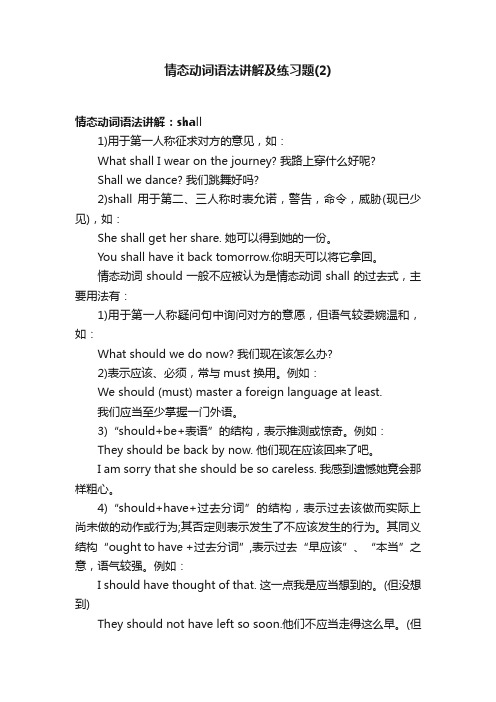
情态动词语法讲解及练习题(2)情态动词语法讲解:shall1)用于第一人称征求对方的意见,如:What shall I wear on the journey? 我路上穿什么好呢?Shall we dance? 我们跳舞好吗?2)shall 用于第二、三人称时表允诺,警告,命令,威胁(现已少见),如:She shall get her share. 她可以得到她的一份。
You shall have it back tomorrow.你明天可以将它拿回。
情态动词should一般不应被认为是情态动词shall的过去式,主要用法有:1)用于第一人称疑问句中询问对方的意愿,但语气较委婉温和,如:What should we do now? 我们现在该怎么办?2)表示应该、必须,常与must 换用。
例如:We should (must) master a foreign language at least.我们应当至少掌握一门外语。
3)“should+be+表语”的结构,表示推测或惊奇。
例如:They should be back by now. 他们现在应该回来了吧。
I am sorry that she should be so careless. 我感到遗憾她竟会那样粗心。
4)“should+have+过去分词”的结构,表示过去该做而实际上尚未做的动作或行为;其否定则表示发生了不应该发生的行为。
其同义结构“ought to have +过去分词”,表示过去“早应该”、“本当”之意,语气较强。
例如:I should have thought of that. 这一点我是应当想到的。
(但没想到)They should not have left so soon.他们不应当走得这么早。
(但已走了)5) 在“It is natural (strange, natural, necessary, surprised, impossible, important ) that……”句型中,主语从句中的谓语动词要用should +动词原形”表示“理所当然”、“奇怪”、“必要”、“惊异”等的意思。
英语情态动词题20套(带答案)及解析
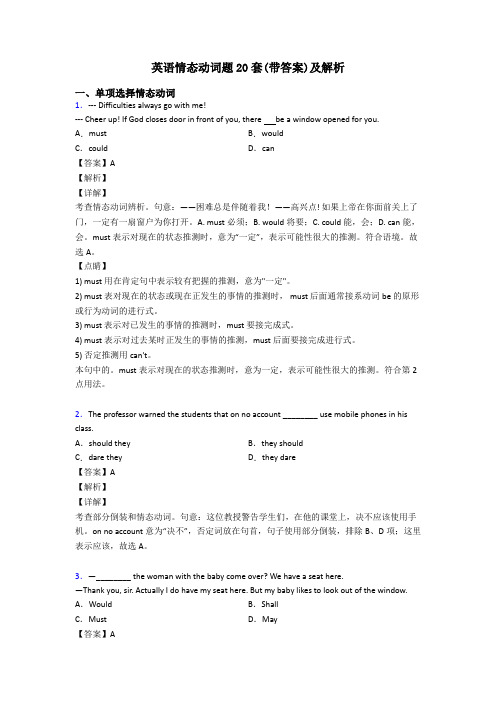
A.shallB.must
C.canD.should
【答案】D
【解析】
【详解】
考查情态动词。句意:我仍然难以想象这样聪明的孩子竟然犯这样愚蠢的错误。should作为情态动词,可以用来表示意外、惊喜或者在说话人看来是不可思议的,常常译为"竟会"、"居然",这么聪明的孩子竟然犯这样愚蠢的错误。表示意外,shall表示允诺,命令等,must表示必须,can表示能力及可能性。所以答案选D。
【答案】B
【解析】
试题分析:考查情态动词用法。Shouldn’t have done本不应该做某事,实际上却做了(虚拟语气);couldn’t have done不可能做某事(对过去情况的推测);needn’t have done本不需要做某事,实际上却做了(虚拟语气);句意:我的姐姐昨天下午在街上遇见了他,所以他不可能去听了你的演讲。故B正确。
3. shall用于第一、第三人称疑问句中,表示说话人征求对方的意见或向对方请示。如:Shall we begin our lesson? When shall he be able to leave the hospital?
4. shall用于第二、第三人称,表示说话人给对方命令、警告、允诺或威胁。如:You shall fail if you don't work harder.(警告)He shall have the book when I finish reading.(允诺)He shall be punished.(威胁)
高考英语情态动词讲解及习题(附答案)
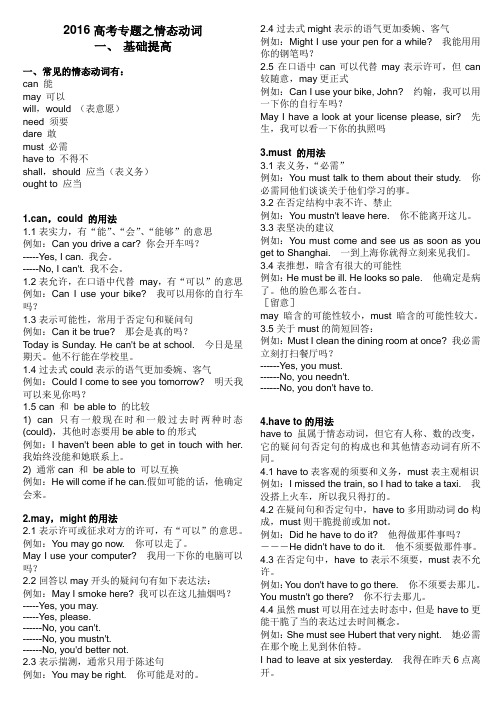
2016高考专题之情态动词一、基础提高一、常见的情态动词有:can 能may 可以will,would (表意愿)need 须要dare 敢must 必需have to 不得不shall,should 应当(表义务)ought to 应当1.can,could 的用法1.1表实力,有“能”、“会”、“能够”的意思例如:Can you drive a car? 你会开车吗?-----Yes, I can. 我会。
-----No, I can't. 我不会。
1.2表允许,在口语中代替may,有“可以”的意思例如:Can I use your bike?我可以用你的自行车吗?1.3表示可能性,常用于否定句和疑问句例如:Can it be true?那会是真的吗?Today is Sunday. He can't be at school.今日是星期天。
他不行能在学校里。
1.4过去式could表示的语气更加委婉、客气例如:Could I come to see you tomorrow?明天我可以来见你吗?1.5 can 和be able to 的比较1) can 只有一般现在时和一般过去时两种时态(could),其他时态要用be able to的形式例如:I haven't been able to get in touch with her.我始终没能和她联系上。
2) 通常can 和be able to 可以互换例如:He will come if he can.假如可能的话,他确定会来。
2.may,might的用法2.1表示许可或征求对方的许可,有“可以”的意思。
例如:You may go now.你可以走了。
May I use your computer?我用一下你的电脑可以吗?2.2回答以may开头的疑问句有如下表达法:例如:May I smoke here? 我可以在这儿抽烟吗?-----Yes, you may.-----Yes, please.------No, you can't.------No, you mustn't.------No, you'd better not.2.3表示揣测,通常只用于陈述句例如:You may be right.你可能是对的。
- 1、下载文档前请自行甄别文档内容的完整性,平台不提供额外的编辑、内容补充、找答案等附加服务。
- 2、"仅部分预览"的文档,不可在线预览部分如存在完整性等问题,可反馈申请退款(可完整预览的文档不适用该条件!)。
- 3、如文档侵犯您的权益,请联系客服反馈,我们会尽快为您处理(人工客服工作时间:9:00-18:30)。
情态动词shall/would/may
1. Excuse me. ______ you please pass me that cup?
A. Do
B. Should
C. Would
D. Must
参考答案:C
本题考查would的用法。
“表委婉地提出请求、建议或看法”应该用情态动词would,该句的意思是“请你递给我那个杯子”,should意思是“应该”,must 意思是“必须”,均不符合句意,故正确答案为C。
2. 用括号中所给单词的适当形式完成句子。
Would you ______ cleaning the window? (mind)
参考答案:mind
情态动词would后面要用动词原形,故该空应填mind。
3. ______ you like to have another try?
A. Could
B. Will
C. Would
D. Do
参考答案:C
“表委婉地提出请求、建议或看法”并且与like搭配的应该用would,故正确答案为C。
4. ______ I have a word with the teacher, sir?
A. May
B. Would
C. Will
D. Should
参考答案:A
本题考查may的用法。
may表示许可或征求对方的许可,意思是“可以”,will 意思是“将要”,would意思是“愿意”,should意思是“应该”,而句意是“先生,我可以和这位老师说几句吗”,故正确答案为A。
5. - May I talk about it with anyone I like?
- No, you ______ .
A. shouldn’t
B. mustn’t
C. needn’t
D. don’t have to
参考答案:B
回答may开头的疑问句,否定回答的结构有“No, you can’t”、“No, you mustn’t”、“No, you’d better not”,故该题正确答案为B。
6. - ______ I visit Lucy on Sunday, Mum?
- Yes, you ______ .
A. Must; can
B. Need; need
C. May; may
D. May; need
参考答案:C
问句的意思是“妈妈,我周日可以去拜访Lucy吗”,因此应该用may,回答may 开头的疑问句,肯定回答结构应该用yes, you may,故该题正确答案为C。
7. - May I go now?
- No, you ______ . You ______ stay here.
A. needn’t; have to
B. nee dn’t; must
C. mustn’t; has to
D. mustn’t; have to
参考答案:D
may开头的疑问句否定回答是用mustn’t,因此先排除A、B,又因主语是you,应该用have to,故该题正确答案为D。
8. She ______ not know about it.
A. will
B. would
C. may
D. should
参考答案:C
本题考查may的用法。
may可以表示“猜测”,通常只用于陈述句中,该句的意思是“她可能不知道这事”,故该题正确答案为C。
9. - What is your mother going to do this Saturday?
- I’m not sure. She ______ go to see my grandmother.
A. can
B. must
C. may
D. need
参考答案:C
根据句意I am not sure可得知“她可能去看我奶奶”,是表示推测,并且不是很确定的推测,因此应该用may,而can和must也表示推测,但是是比较肯定的推测,故该题正确答案为C。
10. You ______ take whatever you like.
A. may
B. would
C. will
D. should
参考答案:A
本题考查may的用法。
may可以表示“允许”,该句话的意思是“无论你喜欢什么你都可以拿走”,故该题正确答案为A。
11. - The room is so dirty. ______ we clean it?
- Of course.
A. Will
B. Shall
C. Would
D. Do
参考答案:B
本题考查shall的用法。
shall常用于第一人称表示“征求对方的意见”,该句的意思是“房间太脏了,我们打扫一下,好吗”,故该题正确答案为B。
12. - Shall I get one more cake for you, Dad?
- Thanks, but you ______ , I’ve had enough.
A. may not
B. must not
C. can’t
D. needn’t
参考答案:D
may not表达不太肯定的推测,must not意思是“决不能”,can’t意思是“不能”,needn’t意思是“不必,不需要”,该句意思应该是“谢谢,但是不必了,我已经吃饱了”,故该题正确答案为D。
